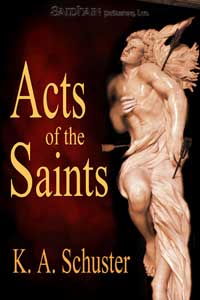First there's the crap you hear from every author: "I've been writing all my life...blah, blah, blah." I was the editor of my fifth-grade class newspaper. I wrote my first short story right around that time. I wrote my first novel--probably more like a novella--in high school. (Wish I'd saved the frickin' thing. It had quite an unusual spec fic premise and erotic storyline. I wasn't a naughty girl in high school--I was actually quite a good girl, at least in terms of academic achievement and sexual restraint--but reading Lady Chatterley's Lover when I was 15 definitely sparked some fantasies that never quite faded.)
Okay, then I spent nine years in college. Couldn't write much during that time except course-related papers. Afterward I churned out batches of truly crappy poetry and some borderline good poetry, a little of which found its way into print. One poem even ended up in the Wisconsin Academy Review--why, I'll never know, because it pretty much sucked. I didn't go back to writing fiction until I was in my thirties--first romance novels, then "serious" novels, then romance novels again and, finally, paranormal erotica.
Don't know which direction I'll take next...
